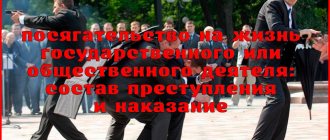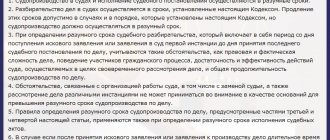Sometimes the work of investigative bodies is hampered due to the fact that the criminal himself or the traces or instruments of his act are hidden. Persons who provide an opportunity for an attacker to escape justice are also breaking the law. However, the Criminal Code provides for only one case in which a person faces punishment for such an act (Article 316). As a result, a large gap appears in the legislation regarding liability for concealing a crime.
Features of the act
Since in practice there are various methods of concealing crimes, and there is only one article in the Criminal Code, a lot of controversial issues arise.
What does Art. 316 of the Criminal Code of the Russian Federation?
Article 316 of the Criminal Code of the Russian Federation, dedicated to concealing a crime and its traces, consists of one part. The text indicates a list of measures for the concealment of particularly serious (!) crimes that were not promised in advance, in other words, unplanned, for which responsibility is provided for by the Criminal Code of the Russian Federation. The note states that the punishment does not apply to close relatives.
Thus, the corpus delicti is quite narrow: the commission of active (both lawyers and courts insist on this definition) actions carried out in order to hide the criminal himself or the means and traces of his crime.
The wording “especially grave” applies to acts for which the accused faces imprisonment for no less than 10 years. Other types of crimes do not fall within the scope of the article.
Article 316 of the Criminal Code of the Russian Federation does not disclose the concept of concealment of a crime. However, many authors refer to the explanations given in Part 5 of Article 33 of the Criminal Code regarding complicity in the commission of a crime, which talks about a promise to hide the attacker or the tools and traces of his crime, as well as items obtained by criminal means. If we exclude the moment of preliminary agreement (Article 316 of the Criminal Code of the Russian Federation deals with unplanned concealment of crimes), this interpretation is quite suitable. Actions to conceal a crime during trials are understood similarly.
The subject of the crime and persons who cannot be him
A sane person over 16 years of age may be punished for concealing a crime. However, a serious amendment to this provision is made by the note submitted in the article, according to which close relatives are not condemned for concealment. This comment was made due to the clash between moral and legal norms: on the one hand, a person cannot extradite a loved one, on the other hand, he is obliged to comply with the law.
Close relatives traditionally include parents, children, grandchildren, grandparents, as well as legal spouses. An important point is the fact of registering the marriage in the registry office. If the criminal is sheltered by his cohabitant, the article will be applied, but if the legal wife is not.
Many scientists believe that such a solution does not fully correspond to the realities of modern life. Some lawyers propose to equate cohabitants to legal spouses if they have children together.
The following video will tell you more about ways to hide crimes:
Legal norms
So, as it becomes clear from what was said earlier, there are many omissions in the legal regulation of concealing a crime.
- The first of them is the absence of not only criminal, but also administrative liability for concealing serious acts and crimes of moderate gravity. It turns out that there is no prohibition on this type of concealment, which means that you can help a criminal who has committed a misdemeanor or a not particularly serious crime with impunity.
- Many citizens are concerned about the issue of concealment of a crime by investigators, which is also not separately considered anywhere. Acts of this kind are, as a rule, brought under Article 286 - Excess of official authority.
- There is a fine line between complicity and concealment. To distinguish between these crimes, it is necessary to establish the presence/absence of a prior agreement.
One more fact should be taken into account: when classifying a crime under Article 316, only the active actions of the concealer are taken into account (an attempt to hide the criminal, his things, the murder weapon, etc.). Failure to report a criminal act committed by someone does not constitute a crime.
Now let's find out how to draw up a statement about concealing a crime and submit it to the police or prosecutor's office.
Who can be the subject of a crime
Responsibility for concealing a crime begins at the age of 16. But there is an amendment to the law that clearly states that people who are relatives of the criminal are not punished for concealment. The fact is that this is contrary to all norms and rights, because not every person can extradite their loved one, even if he is a criminal. But we must also remember that there is such a thing as civic duty. Relatives who cannot be held responsible for concealment include:
- Parents of the criminal.
- His own children and grandchildren.
- Elderly relatives, such as grandparents.
- Legal spouses. It is important that the spouses are registered with the registry office, because the cohabitant will be fully accountable to the law.
Statement on concealing a crime
Like other statements whose purpose is to report a violation of the law, a statement of concealment is submitted to the police or prosecutor's office.
The format of this paper is standard:
- “Caption” in the right corner, including information about the person to whom the application is addressed and about the citizen who submitted it;
- The title of the document is in the middle of the sheet;
- The essence of the appeal;
- Signature and date.
Statements accusing law enforcement officers of concealment are often submitted to the chairman of the investigative commission. Read on to find out what liability and punishment are provided for concealing a crime and assisting in such an act.
"Identification of hidden crimes"
- home
- Residents
- Interaction and cooperation
Supervision over the implementation of laws when recording, registering and resolving reports of crimes by employees of internal affairs bodies continues to remain one of the priorities in the activities of the Kalininsky District Prosecutor's Office.
Particular attention is paid to the practice of identifying hidden crimes, analyzing methods of concealing them, as well as improving and disseminating the methodology of supervisory activities. The results of the work of law enforcement agencies are discussed quarterly at coordination meetings with the leadership of the district prosecutor's office.
The analysis showed that the most common method of concealing crimes remains the issuance of illegal decisions to refuse to initiate criminal proceedings.
All of these decisions are checked by the district prosecutor's office in the manner of supervision, and in cases of discovery of facts indicating the commission of illegal acts provided for by the Criminal Code of the Russian Federation, comprehensive measures are taken to protect the violated rights of citizens to access justice and, as a result, initiate criminal proceedings.
Also, in the course of supervisory activities in order to identify crimes hidden from registration, employees of the district prosecutor’s office use the practice of obtaining explanations from citizens, according to whose applications the body of inquiry refused to initiate a criminal case, as a result of which criminal cases were subsequently initiated based on a number of materials on the initiative of the district prosecutor’s office.
Another, but less common way of concealing a crime is the refusal to accept an application and report of a crime, or its failure to register it in the Book of Accounting of Statements (Reports) of Crimes, Administrative Offenses and Incidents.
In this case, you need to know that when the applicant personally contacts the duty station, the operational duty officer who accepted the statement of crime is required to issue a coupon, which consists of two parts: a coupon-stub and a coupon-notification, both having the same registration number.
The coupon stub contains information about the applicant, a brief content of the statement about the crime, about the administrative offense, about the incident, the registration number according to the KUSP, the signature of the operational duty officer who received him, the date and time of reception.
The notification coupon indicates: special rank, surname, first name, patronymic of the operational duty officer who accepted the statement of crime, registration number according to the KUSP, name of the territorial body of the Ministry of Internal Affairs of Russia, address and office telephone number, date and time of reception, signature of the operational duty officer.
When receiving a notification coupon, the applicant puts the date and time of receipt on the receipt coupon.
The district prosecutor's office regularly conducts inspections of territorial police departments for compliance with the requirements of the current legislation regulating the reception, registration and consideration of applications and reports of crimes, administrative offenses, incidents; if violations are detected, the head of the district Ministry of Internal Affairs is asked to engage specific officials persons to disciplinary liability.
Senior Assistant Prosecutor
Kalininsky district
lawyer 2nd class E.S. Zagorodnyuk
Responsibility for concealing a crime
Responsibility for concealing someone else's crime is provided for only in the Criminal Code, and the crime in question must be classified as especially serious. A person who is not a close relative or spouse of a subject who has committed a particularly serious crime may face one of the penalties established by Article 316 of the Criminal Code for concealment:
- A fine of 200,000 rubles maximum, or equal to the income of the accused for a certain period (up to one and a half years);
- Arrest (3 – 6 months);
- Imprisonment (up to 2 years).
As you can see, the sentence under Art. 316 of the Criminal Code of the Russian Federation can be very harsh. We hope that the knowledge gained will help you not to become a victim of this crime or other crimes against justice (for example, an unjust decision by a court, false reporting, illegal arrest, etc.).
The following video will tell about a case from judicial practice on the issue of concealing a crime:
What exactly is a cover-up?
Concealing a crime is a special act that is aimed at hiding the criminal, providing him with shelter, also helping to make fake documents, and changing his appearance. What punishment the party who committed these illegal actions will bear will be decided solely by the court. As a rule, this can be a fine of two hundred thousand rubles, or the offender can be arrested for up to two years. The type of punishment is determined only when the fact of involvement in a given crime is confirmed, and also depending on what kind of crime was hidden from investigators.
Concealing a crime through intellectual and physical actions
Concealing traces of a crime can be accomplished both physically and through intellectual actions. Most often, an example for highlighting such a concealment is self-incrimination or giving false testimony in favor of the accused, in order to divert suspicion from the real criminal. In this case, justice may follow the wrong trail, and the criminal himself may escape at this time. Also, advice on how best to hide, how to properly hide a weapon or get rid of the body of a murdered person can also act as intellectual activity. Concealment is also considered to be hiding traces of a crime, for example, when a pedestrian was hit and a car was damaged. To prevent the investigation from finding the criminal, the car was repaired by a second person or the car was set on fire.
What measures are recommended to be taken to reduce the concealment of crimes?
It should be noted that every year the number of crime concealers is growing. Despite this, the crime detection rate is also growing; there are many cases where crimes were solved and the concealers were punished. True, there is little comfort in this. Many experts believe that strict measures should be taken when even the slightest concealment of a crime occurs; the Criminal Code of the Russian Federation is incomplete in this area. There is serious work ahead in this regard. Today, cases have begun to occur more often when a crime is concealed in which all the persons who committed it are known. There is only one motive in this case - to get your own benefit.
To avoid such developments in society in the future, it is necessary to differentiate responsibility even for concealment that was not promised in advance. Given the seriousness of the crime that can be committed, the court must impose punishments with consideration of all the smallest details and taking into account the harm that has been caused to society. The judicial authorities should be treated especially harshly, as they may also actively take part in the cover-up, thus pursuing their own selfish goals.
As we can see, the article on concealing a crime has its own shortcomings, which must be removed in the future. In order for a conflict to be resolved through precise actions, precise criteria for holding accountable persons who have even the slightest connection to the crime are necessary. Covering up crimes can be interpreted in completely different ways, which makes it possible for the court not always to make an objective assessment of the actions. The result of such actions may vary. Sometimes innocent people end up behind bars, while real criminals continue to break the law while free. But all this can be easily avoided by making small amendments to the law. Punishment for concealing a crime must necessarily apply to officials and authorities.
When is a crime committed?
Concealing a crime can be considered committed in different ways in different cases. The fact is that if it is necessary to conceal something that was acquired illegally, for example, a weapon, or if its storage is revealed, then the concealment of a crime is a fact from the very minute when the second person became aware of it. The law takes into account only those actions that were completed, even if they were to some extent incomplete. For example, even if the criminal did not fully achieve the goal of his crime, he will still be punished.
What are the goals of the concealer?
The purpose of concealing a crime can be different. Naturally, the first priority is the desire to hide illegal acts from justice. Investigators may also regard such steps as obstruction of the investigation and the authorities of justice. Criminals often have their own selfish motives as motives. For example, people can be motivated by feelings of love, sometimes the motive can be the intimidation of a person by a criminal. Of course, motives are not part of the crime, but it should be noted that they are taken into account when punishment is imposed.
Difficulties for the investigation that may be caused by concealing a criminal
Considering in detail this concept - concealment of a crime (Article of the Criminal Code of the Russian Federation No. 316), one should pay attention to the fact that the article has many nuances. It is important to remember the distinction between types of concealment. For example, they try to hide a wanted item because it was obtained through criminal means. The investigation's decision regarding the concealer will depend on how exactly the item was acquired. In this case, this fact can be considered as direct intent, because the concealer is aware of the nature of the crime, and on the other hand, the crime may be unsolved. In any case, the court will take into account the goals pursued by the concealer.









